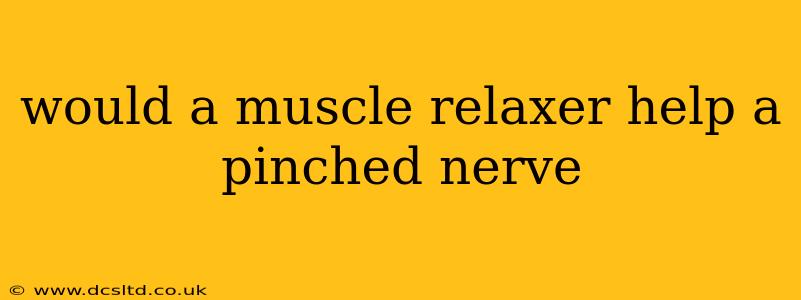A pinched nerve, also known as a compressed nerve, occurs when surrounding tissues, such as bones, muscles, tendons, or ligaments, put pressure on a nerve. This pressure can cause pain, numbness, tingling, weakness, or other symptoms depending on the location of the pinched nerve. Many people wonder if a muscle relaxer could offer relief. The answer isn't a simple yes or no, and it depends on several factors.
How Muscle Relaxers Work
Muscle relaxants, as their name suggests, primarily work by reducing muscle spasms and stiffness. They achieve this by interfering with nerve impulses that cause muscles to contract. This can be helpful in situations where muscle spasms are contributing to nerve compression. However, they don't directly address the underlying cause of the nerve compression.
Can Muscle Relaxers Help with a Pinched Nerve?
In some cases, yes, muscle relaxants can provide temporary relief from the pain and discomfort associated with a pinched nerve. This is particularly true when muscle spasms are a significant component of the problem. By relaxing the surrounding muscles, the pressure on the nerve may be lessened, leading to reduced pain and improved function. However, it's crucial to understand that muscle relaxants are not a cure for a pinched nerve.
When Muscle Relaxants Might Be Prescribed
A doctor might prescribe a muscle relaxer for a pinched nerve if:
- Muscle spasms are present and contributing to the pain: If the pinched nerve is causing significant muscle spasms that are worsening the compression, a muscle relaxer can help break the cycle of pain and spasm.
- Pain is severe and interfering with daily activities: Muscle relaxers can provide temporary pain relief, allowing the patient to manage daily tasks more easily.
- Other treatments have not been effective: If other conservative treatments like rest, ice, physical therapy, or over-the-counter pain relievers haven't yielded sufficient results, a doctor might consider adding a muscle relaxer to the treatment plan.
When Muscle Relaxers Might Not Be Helpful
Muscle relaxants are not always the best solution for a pinched nerve, and they may not be helpful if:
- The nerve compression is due to a structural issue: If the nerve is compressed by bone spurs, herniated discs, or other anatomical abnormalities, a muscle relaxer will not address the root cause.
- The pain is primarily due to nerve inflammation: Muscle relaxers primarily target muscle spasms, not nerve inflammation. In these cases, anti-inflammatory medications or other treatments might be more appropriate.
- The patient has a history of drug allergies or sensitivities: Muscle relaxants can have side effects, and individuals with allergies or sensitivities should discuss this with their doctor.
What are the side effects of muscle relaxants?
Muscle relaxants can cause drowsiness, dizziness, and weakness. Some people experience nausea, constipation, or dry mouth. It's crucial to follow your doctor's instructions and be aware of potential side effects.
Are there alternative treatments for a pinched nerve?
Yes, many other treatments can effectively manage a pinched nerve. These include physical therapy, over-the-counter pain relievers (like ibuprofen or naproxen), ice or heat therapy, and in some cases, surgery. Your doctor will recommend the most appropriate treatment based on your specific situation.
How long does it take for a pinched nerve to heal?
Recovery time varies significantly depending on the severity of the compression and the underlying cause. Some pinched nerves resolve within a few weeks with conservative treatment, while others may require longer treatment or surgical intervention.
Should I see a doctor about my pinched nerve?
It's always best to consult a healthcare professional if you suspect you have a pinched nerve. They can diagnose the problem accurately, rule out other potential causes, and recommend the most effective treatment plan for your individual needs. Don't self-treat; seeking professional medical advice is crucial for proper diagnosis and management.
This information is for general knowledge and does not constitute medical advice. Always consult with a healthcare professional for diagnosis and treatment of any medical condition.
